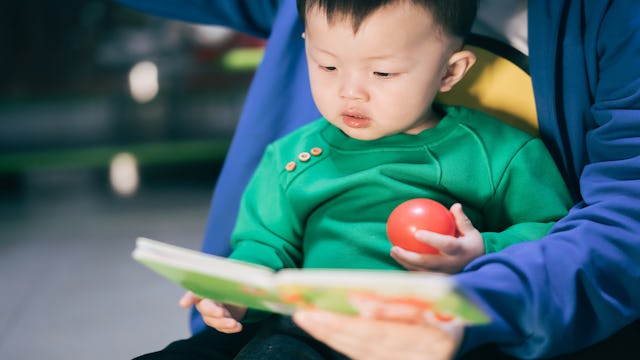Kids Who Are Read To Before Kindergarten Have A 'Million Word' Advantage Over Peers

The results of this study will make you want to sit down and ready as many books as possible with your kids tonight
Reading to your children is absolutely invaluable to their knowledge and this new study confirms it. Kids whose parents read to them five books a day enter kindergarten having heard about 1.4 million more words than kids who were never read to — that is huge.
According to the study, conducted by Ohio State University, the “million-word gap” is a key component in explaining vocabulary and reading development differences. Even kids who are read only one book a day will hear about 290,000 more words by age 5 than those who don’t regularly read books with a parent or caregiver.
“Kids who hear more vocabulary words are going to be better prepared to see those words in print when they enter school,” said Jessica Logan, a member of Ohio State’s Crane Center for Early Childhood Research and Policy. “They are likely to pick up reading skills more quickly and easily.”
The idea for this research came from a previous study where Logan and her colleagues found about one-fourth of children in a national sample were never read to, and another fourth were seldom read to (once or twice weekly). “The fact that we had so many parents who said they never or seldom read to their kids was pretty shocking to us. We wanted to figure out what that might mean for their kids,” Logan said. So she and her colleagues got to work on a new study.
The research team randomly selected 30 books from a list of the 100 most circulated books for both board books (which are targeted toward infants and toddlers) and picture books (which are aimed toward preschoolers). They were able to determine that board books contain an average of 140 words, while picture books have about 228.
Using that information, they were able to calculate how many words a child would hear from birth through their fifth birthday at different levels of reading each type of book — and that each session would include at least one book. To distinguish a comparison for the research, the team estimated one book every other month for children who are rarely read to.
Based on these calculations, here’s how many words kids would have heard by the time they were 5 years old:
- Never read to: 4,662 words
- Read to once or twice per week: 63,570 words;
- Read to three to five times per week: 169,520 words
- Read to daily: 296,660 words
- Five books a day: 1,483,300 words
“The word gap of more than 1 million words between children raised in a literacy-rich environment and those who were never read to is striking,” Logan said.
It truly is. Parents are busy and work and school schedules can make it difficult to find the time to sit down and read books together every single day. But reading a 140-word book takes five minutes, tops. If you’ve got five minutes and your kiddo is willing, reading as part of your daily or nightly routine is undeniably worth it in every way.
Logan says it’s important to note that the vocabulary gap studied here is entirely different from a conversational word gap. “This isn’t about everyday communication,” she says. “The words kids hear in books are going to be much more complex, difficult words than they hear just talking to their parents and others in the home.”
Children’s books cover everything from imaginary friends to fairies to animals all over the world — subjects that don’t come up organically in conversations with our kids. “The words kids hear from books may have special importance in learning to read,” Logan says.
Reading to your kids is so important. Beyond learning new words, it’s a really great time to bond with each other, be silly together, and learn something new. Libraries are a godsend for parents everywhere, too. Exposure to books and new vocabulary is something all families can benefit from, kids most of all.
This article was originally published on